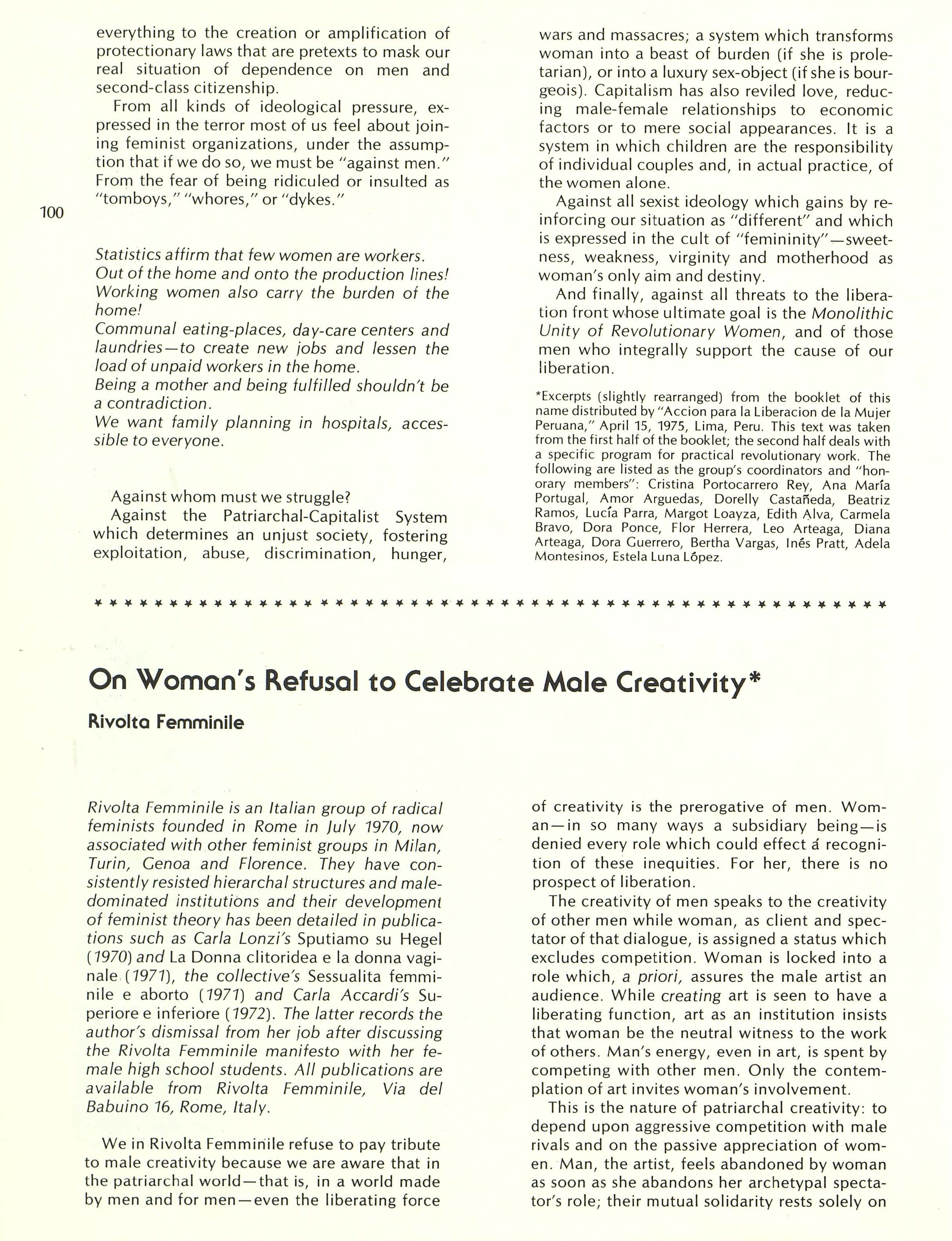
From the First-Issue Collective
Toward Socialist Feminism
Tijuana Maid
Women in the Community Mural Movement
Women and Honor: Some Notes on Lying
Adman
Zucchini Poem
The Art of Not Bowing: Writing by Women in Prison
Astrology Hype
Ten Ways of Looking at Prison Lunch
Alone
La Roquette, Women's Prison
Fays, Floozies, and Philosphical Flaws
The Esthetics of Power in Modern Erotic Art
ABCS
Do You Think
the empress anastasia in new york
Dead in Bloody Snow
Notes From the First Year
Feminist Abstract Art--A Poltical Viewpoint
"Female Experience in Art": The Impact of Women's Art in a Work Environment
The Pink Glass Swan: Upward and Downward Mobility in the Art World
Juggling Contradictions: Feminism, the Individual and What's Left
Moratorium: Front Lawn: 1970
Who Are We? What Do We Want? What Do We Do?
On Women's Refusal to Celebrate Male Creativity
What is Left?
Around Coming Around
Wages for Housework: The Strategy for Women's Liberation
On Woman's Refusal to Celebrate Male Creativity
Rivolta Femminile
We in Rivolta Femminile refuse to pay tribute to male creativity because we are aware that in the patriarchal world—that is, in a world made by men and for men—even the liberating force of creativity is the prerogative of men. Woman—in so many ways a subsidiary being—is denied every role which could effect a recognition of these inequities. For her, there is no prospect of liberation.
The creativity of men speaks to the creativity of other men while woman, as client and spectator of that dialogue, is assigned a status which excludes competition. Woman is locked into a role which, a priori, assures the male artist an audience. While creating art is seen to have a liberating function, art as an institution insists that woman be the neutral witness to the work of others. Man's energy, even in art, is spent by competing with other men. Only the contemplation of art invites woman's involvement.
This is the nature of patriarchal creativity: to depend upon aggressive competition with male rivals and on the passive appreciation of women. Man, the artist, feels abandoned by woman as soon as she abandons her archetypal spectator's role; their mutual solidarity rests solely on the conviction that, as a spectator gratified by creativity, woman reaches the highest possible point in the evolution of her species.
But, on the contrary, woman is discovering that the patriarchal world needs her—that man's self-liberating efforts absolutely depend on her—and that woman's liberation can only be realized independent of patriarchal previsions and the dynamics by which men liberate themselves. The artist depends upon woman to glorify his work and she, until she begins her own liberation, is happy to oblige. The work of art cannot afford to lose the security inherent in her exclusively receptive role.
Once aware of her position in relation to male creativity, woman is left with two possibilities: the first—until now, the only available option—of distinguishing herself within the creative hierarchy historically defined by men (which alienates her from other women while men recognize her only indulgently); or—the feminist alternative—of autonomously recovering her own creativity, nourished by her awareness of past oppression.
To celebrate male creativity is ultimately to submit to the historic sovereignty of men, to that patriarchal strategy which deliberately subjugates us. But let woman remove herself, and the struggle for male supremacy becomes not man lording it over woman, but merely a struggle between individual men.
By refusing to celebrate male creativity, we are not judging creativity, nor are we contesting it. Rather, with our absence, we are refusing to accept it as defined; we are challenging the concept of art as something which men graciously hand down to us. By ceasing to believe in a refracted liberation, we are unleashing creative energy from patriarchal bonds.
With her absence, woman performs a dramatic act of awareness, creative because it is liberating.
Text written by Rivolta Femminile, March 1971; free translation by Arlene Ladden from Carla Lonzi, Sputiamo su Hegel: La Donna clitoridea e la donna vaginale e altri scritti, Scritti di Rivolta Femminile, 1, 2, 3, Milan, 1974.
Rivolta Femminile is an Italian group of radical feminists founded in Rome in July 1970, now associated with other feminist groups in Milan, Turin, Genoa and Florence. They have consistently resisted hierarchal structures and male-dominated institutions and their development of feminist theory has been detailed in publications such as Carla Lonzi's Sputiamo su Hegel (1970) and La Donna clitoridea e la donna vaginale (1977), the collective's Sessualita femminile e aborto (1977) and Carla Accardi's Superiore e inferiore (1972). The latter records the author's dismissal from her job after discussing the Rivolta Femminile manifesto with her female high school students. All publications are available from Rivolta Femminile, Via del Babuino 16, Rome, Italy.
